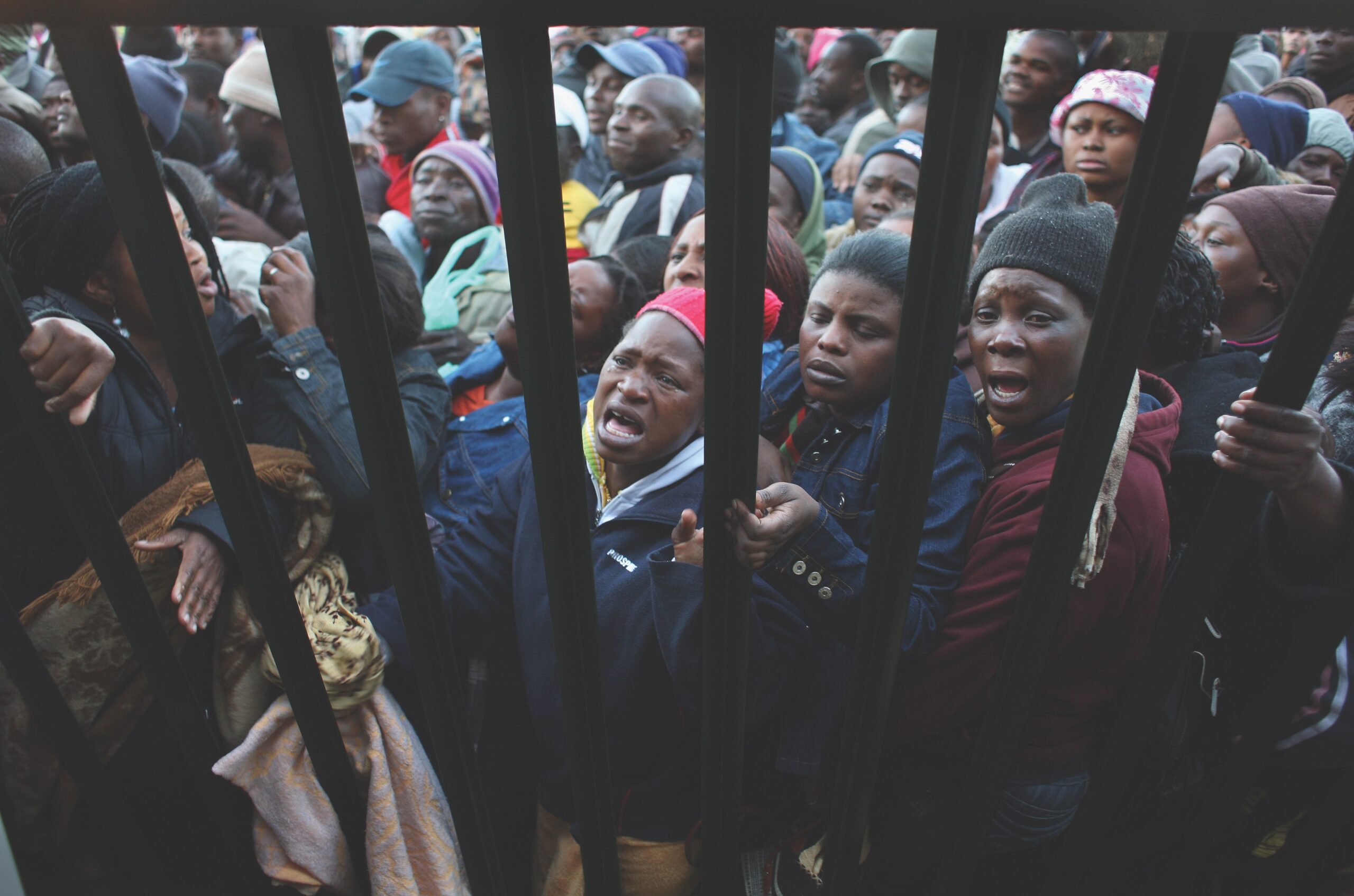John Taona* was married with a young daughter and twins on the way when he was murdered in Zimbabwe almost 20 years ago. He had been waiting for a friend outside a strip mall when a group of men attacked him. His killers were never found, and their motive was a mystery — in a country rife with political violence, Taona had never been involved politically. His widow remained in the country to raise their children. But when the kids were teenagers, the family began receiving threats by men who claimed to be her husband’s killers.
That’s when Taona’s sister Ruth Sowah* lost contact with the family. Sowah had come to Canada as a student in the early 1980s, met her husband and settled in Edmonton. A member of Southminster-Steinhauer United, she has worked in refugee settlement in Edmonton for almost 20 years. She kept in touch with her sister-in-law and her nieces and nephew (the twins — a girl and a boy — were born a month after their father was killed). She’d inquire about their education and make sure the family had enough money for tuition and school supplies. But then she heard from another relative about the threats and that the family couldn’t be found. The house had been abandoned without any sign of packing up. Sowah assumed the worst. “We didn’t know if they’d been killed and just thrown somewhere,” she says.
You may unsubscribe from any of our newsletters at any time.
Several months later, she got a phone call from a refugee camp in Botswana. She learned of the days her brother’s family had spent hiding in the bushes, their bus ride into Botswana, their detainment by police before getting an interview at the United Nations office, and finally their arrival at the refugee camp.
Soon after that phone call, the outreach committee at Sowah’s church started fundraising and filling out the paperwork to sponsor her family. They submitted the application in 2009. This wouldn’t have been possible had Sowah lived elsewhere. Canada is the only country in the world where churches and other non-governmental groups are able to name refugees they want to sponsor and support them upon their arrival. There are approximately 90 private groups, mostly churches, who hold sponsorship agreements with the government. For decades, these groups have been welcoming refugees into their communities through what are termed “private sponsorships.” But this might change.
Over the past decade, the government has accepted between 3,000 and 4,000 privately sponsored refugees every year (a number that has increased in the last three years). However, sponsorship agreement holders, which account for the majority of private sponsorships, have collectively submitted applications for between 5,000 and 8,000 people per year, leading to a backlog of over 23,200 refugees stuck in the bottleneck of bureaucracy and long wait times. To deal with the problem, the Canadian government has declared caps on new applications while it works at clearing the backlog. This year’s cap is set at 1,350 refugees from sponsorship agreement holders — with a mere 18 allocated to The United Church of Canada. For these sponsors, restricting the number of applications they file represents a huge shift in how they operate. Some fear the caps will lead to the death of private sponsorships. Others concede they are necessary to rescue a foundering program.
Long wait times aren’t a trivial matter. Cases have been withdrawn because the applicant is killed while awaiting an answer. Other applicants languish for years in refugee camps. While it often takes two or three years for refugee cases to make their way through the system, at some visa offices, like those in Nairobi and Cairo, it can now take seven or eight years.
“It’s like they are locked up there,” says Khwaka Kukubo, an adviser for The United Church of Canada’s refugee program, who has worked in Kenya’s overpopulated refugee camps. “You just sit there, day in and day out, in this place. You can’t travel freely. A lot of people have been born there; that’s all they know. It’s such a hopeless life.”
Private sponsorship groups hoping to bring refugees to Canada have two types of sponsorships to choose from: “named” or “visa office-referred.” The visa office-referred cases, which many United Church constituents have taken on, are not included under the new caps. In these cases, the Canadian government has already selected the refugees and completed most of the paperwork for them. While the process is a lot faster, there are a limited amount of these sponsorships available at any given time — only 20 at the end of last year.
Because these refugees don’t necessarily have connections in a given community, private sponsors help them settle in Canada. The United Church, for example, only completes around 50 sponsorships per year (although the number was dramatically higher in 2011), but its constituent groups often invest lots of time and money on each one.
Jim Acheson is a United Church member whose non-profit organization, the Don Valley Refugee Resettlers, sponsors one refugee family a year through the United Church’s sponsorship agreement. He says the group raises about $45,000 to support the average family for that first year. This includes paying rent for an apartment, furnishing it, and paying for food, clothing and other living expenses. Group members also spend a lot of time helping the family settle into its new community.
With named sponsorships, which make up the majority of private sponsorships, a private group submits an application on behalf of someone already established in the community hoping to bring in relatives facing persecution overseas — situations like that of Ruth Sowah. Sometimes the family members in Canada will cover most or all of the costs. In these arrangements, without the burden of raising funds, groups are able to sponsor family members en masse. Three organizations in particular are known for submitting very large numbers of these types of applications.
While some blame the government for capping the number of refugee applications and punishing the goodwill of Canadian sponsors, many point fingers at those private sponsors churning out more refugee sponsorships than the rest and putting increasing pressure on the program.
“Most people just kept ignoring the arithmetic,” says Ian McBride, the director of Toronto’s Anglican United Refugee Alliance (AURA). “The collective of [private sponsors] put in way more sponsorships than the government was either willing or able to digest on an ongoing basis.” He says he’s argued this point in meetings over the years, but to no avail.
Tom Denton, executive director of sponsorship at the Hospitality House Refugee Ministry in Winnipeg, believes this type of criticism is misguided. His non-profit organization is one of the big-three sponsors. “We’re rescuing people — as many as we possibly can,” he insists. Denton doesn’t see anything wrong with submitting more applications than the average sponsor; he quotes a former colleague who would respond to such criticism by saying, “What makes your refugees any better than my refugees?”
He believes the root of the problem isn’t that the number of submissions is too high but that the government’s targets for overall immigration are too low — generally hovering at around 250,000 a year. A number closer to 500,000 would be more appropriate, he says.
Ironically, as one of those blamed for creating the bottleneck, Denton is not unnerved by the caps. “This is not a cessation. This is an interruption in filing new cases, for a very legitimate reason,” he says, referring to the need to reduce the backlog and bring down wait times. “It’s no different whether the case sits for two years in the dust on top of your refrigerator or in the dust of an in-basket in Nairobi. It’s still going to take time.”
And in fact, at the same time as the government has imposed the cap on new applications, it has increased its targets for privately sponsored refugees by over 2,000, or more than double what it was just over a decade ago. This will allow administrators to tackle the backlog faster. It’s a positive move for the program — one that has been overshadowed by the caps.
“When people hear there’s a cap on submissions, and they hear what the number is, they think it’s the end of the program,” says Paulette Johnson, who chairs a group of elected representatives for the private sponsors. “But it’s because they don’t realize that actually the number of arrivals are growing, and are continuing to grow — up to 6,500 for 2013.”
It’s difficult to tell whether the caps will act as a healthy diet to burn off that excess backlog, or whether they will starve the program to death by stripping refugee sponsorship groups of their resolve. Already, people like the United Church’s Khwaka Kukubo feel discouraged by the caps. “I feel like we’re being punished for helping people,” she says. “I feel like they are not happy that we’re helping.”
Heather Macdonald, a United Church sponsor and former national adviser for the church’s refugee program, is also concerned about the overall effect. “My real worry is, if you stop it like this, if you remove any momentum, you put it on the backburner for two, three, four years, can you restart it? Will there be an interest?” she asks.
When Macdonald was the United Church adviser in 2004, she encouraged constituent groups to take visa office-referred cases with fast arrivals so sponsors could turn their focus to helping refugees settle in their new communities. She also began screening named cases, in an effort to make sure everything church groups submitted would have a chance of succeeding and not needlessly add to the backlog.
“Congregations had their noses out of joint,” she recalls. “Suddenly we were saying, ‘No, no, no. Admissibility, eligibility — let’s see this, let’s see that,’ and I think they thought we were worse than the immigration officials.” Macdonald believed this was the responsible approach and would help keep constituent groups on track.
She wasn’t alone. “I stopped submitting to Nairobi a long time ago,” says Ian McBride of AURA. “Why submit and wait for seven years?” He remembers that one time they received an arrival date for a case that had been stuck in the system for years. When he tried to locate the constituent group, he couldn’t. The minister knew nothing about it and two of the committee members had died.
“You can’t keep a group interested for five years at a time, waiting for a case,” he says. Unlike the groups who submit cases to which relatives living in the community will still be committed when the refugees arrive years later, constituent groups who have no prior personal connection to the refugees can lose motivation. “I frankly think social justice works better when the people involved have some idea that’s what they’re doing,” says McBride.
But now the United Church has been penalized for being careful: likely because the number of refugees it has sponsored over the past decade has decreased, the number of applications it can submit this year under the new caps is small. Furthermore, most United Church constituent groups are not currently awaiting cases held up in the backlog. With no new arrivals, these groups won’t have any refugee sponsorship activities to hold their interest.
Meanwhile, groups that have submitted high numbers of applications in recent years will be busy on the settlement side as Citizenship and Immigration Canada works through the backlog. They needn’t worry about keeping the momentum going under the caps. For private sponsors, one of the harshest results of the new caps might be discord among a group of people who all have very good intentions. For a community that has been operating without imposed limits, deciding who gets to submit how many cases could be challenging. Although Citizenship and Immigration Canada has allocated groups for 2012, the 90 agreement holders are supposed to work this out among themselves in 2013 and beyond.
“I’m afraid the 90 of us are just going to be fighting among ourselves for the next few years,” says Macdonald. “It’s going to be a whole new way of operating for us all. It’s just not what I envisioned of a volunteer program.”
And in such a drama-filled vocation, where stories of persecution and desperation abound, arguments over which cases get through will most certainly be emotionally charged. Macdonald’s end-of-the-year rush was a perfect example. Despite her preference for visa office-referred cases, even she makes exceptions when faced with what’s known as the “echo effect” — refugees arriving and inquiring about rescuing relatives they’ve left behind.
After a visa-office-referred family of Iraqi Palestinians arrived in Canada last June, sponsored by B.C.’s Westminster Presbytery and the B.C. Muslim Association, Macdonald learned that one of the adult sons had a fiancée — also an Iraqi Palestinian — who’d been left behind in Syria. “If I didn’t act,” says Macdonald, “he’s not going to have a fiancée.”
So at the end of last year, Macdonald found herself racing to get a named sponsorship application in before the cap took effect. “I thought, ‘Okay, one case can’t hurt.’ But I don’t know who else is thinking one case can’t hurt. I’m sure some are thinking 10 can’t hurt.”
This is the kind of human drama that pushes application numbers far over government targets and gets trampled under application caps. For those who have been doing this social justice work without limits for years, it will be hard to hold back.
“I do worry what might happen to what’s been a wonderful volunteer program,” says Macdonald. “I really see it as a change agent for Canada.”
Meanwhile, Ruth Sowah is eagerly looking forward to the arrival of her sister-in-law, nieces and nephew. Although the family has been waiting almost three years and some church members are getting frustrated about the delay, Sowah has seen worse.
“Working in this sector, I see many families who have put in their applications for seven, eight, nine years. And seeing the frustration . . . when I look at my own family, I think I’ve been blessed,” she says.
Her family members have been interviewed, had their medical exams and been told that they can expect to arrive early this year. Sowah and other church members have raised $11,000 of the $19,000 the constituent group pledged to contribute. And as the arrival approaches, they are busy with tasks like registering the kids in schools, getting them dental work if needed and making sure there’s enough bedding in the house.
The caps did not affect her family’s application, but Sowah knows it will be bad timing for others. “It’s frustrating for people whose families just got into a refugee camp,” she says. On the other hand, she thinks something does need to be done to shrink the backlog and long wait times.
Heather Macdonald prays this will be the outcome of the caps. “Hopefully, for those who are in the waiting line, our having to do this will help them. That is the only way it can be acceptable,” she says. “If, a year from now, or two years from now, it hasn’t, then this is just cruel.”
*Names have been changed to protect identities
***
This story first appeared The United Church Observer’s February 2012 issue with the title “Caught in the bottleneck.”














